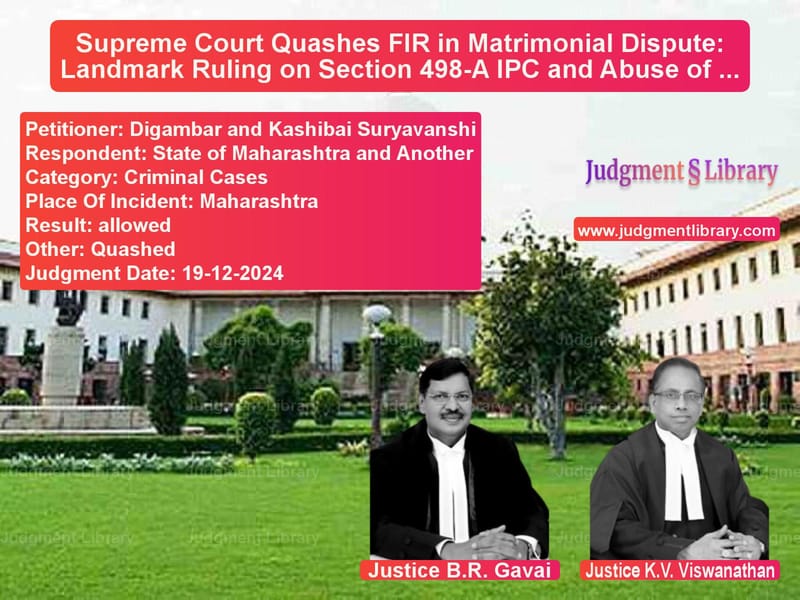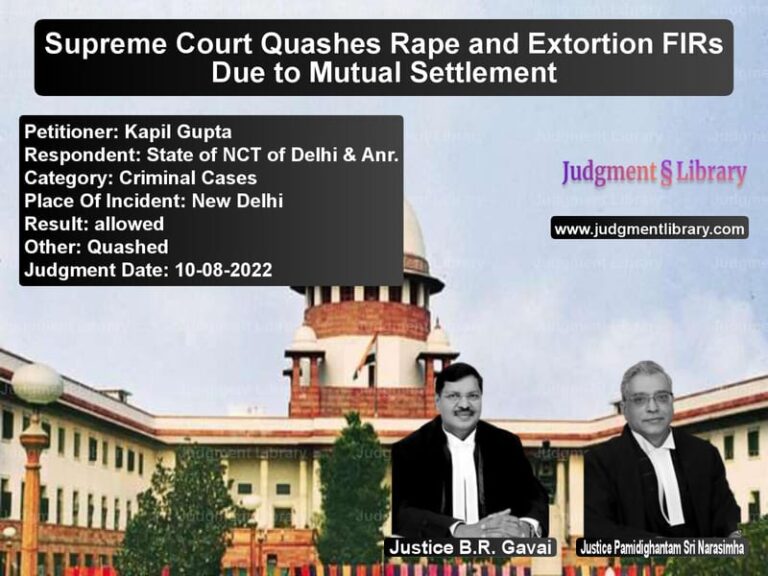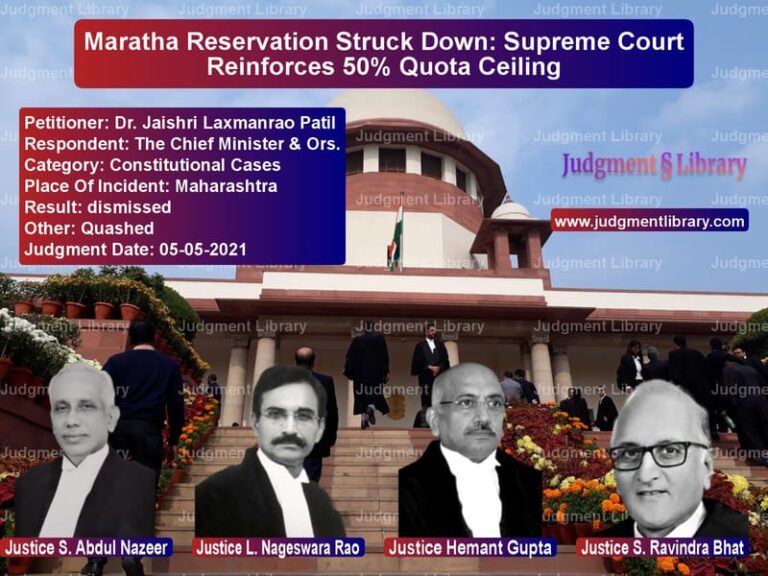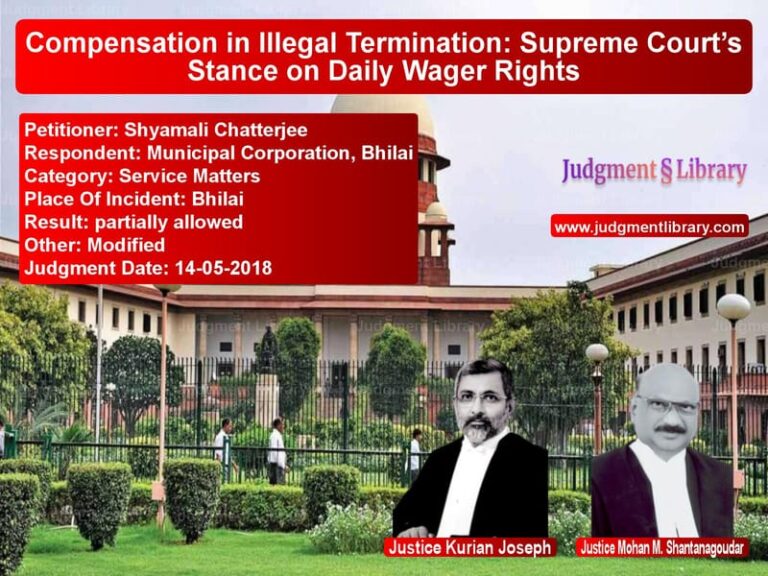Supreme Court Quashes FIR in Matrimonial Dispute: Landmark Ruling on Section 498-A IPC and Abuse of Process
The Supreme Court of India, in the case of Digambar and Another vs. The State of Maharashtra and Another, delivered a significant judgment on December 20, 2024, concerning the abuse of legal provisions in matrimonial disputes. The Court quashed the First Information Report (FIR) filed under Section 498-A, 312, 313, and 34 of the Indian Penal Code (IPC), stating that the allegations were vague and amounted to an abuse of process. The ruling highlights the misuse of criminal provisions in family disputes and the need for precise allegations when invoking such serious charges.
Background of the Case
The case revolves around a matrimonial dispute between the complainant, Pushpa Madhav Suryavanshi, and her husband, Madhav Suryavanshi, along with his parents, the appellants, Digambar and Kashibai Suryavanshi. The marriage took place on March 26, 2006, and two daughters were born from the union. After the birth of their second daughter, the husband and the appellants allegedly started pressuring the complainant to bear a male child. This demand led to both mental and physical cruelty, causing the complainant to reside separately from February 2018.
Further allegations were made regarding an incident that occurred on November 28, 2016, when the appellants allegedly coerced the complainant into consuming a meal, which she believed led to a miscarriage. The complainant filed a complaint based on these events, accusing her in-laws of cruelty and causing a miscarriage through forced ingestion of food. The appellants then sought the quashing of the FIR, arguing that the allegations were fabricated and that they had no role in the miscarriage.
Legal Issues Raised
- Whether the allegations in the FIR constitute offences under Section 498-A, 312, 313, and 34 of the IPC.
- Whether the allegations made in the FIR were vague and without specific details to form the basis for criminal prosecution.
- Whether the criminal proceedings were instituted with an ulterior motive, especially in light of the ongoing divorce proceedings.
Arguments Presented
Arguments by the Appellants
- The appellants argued that the FIR was based on vague and general allegations that lacked specificity regarding the alleged cruelty or miscarriage.
- The appellants contended that the complainant had not provided clear instances of cruelty or abuse, and no specific allegations were made regarding their involvement in the miscarriage.
- The appellants further argued that the timing of the FIR—filed after the divorce proceedings were initiated—suggested that the complaint was filed as a retaliatory measure.
- The appellants emphasized that the medical records did not support the claim of a forced miscarriage and that the allegations against them were fabricated.
Arguments by the Respondents (State and Complainant)
- The respondents argued that the FIR disclosed a prima facie case of offences under Section 498-A (cruelty), Section 312 (causing miscarriage), and Section 313 (causing miscarriage without consent), particularly with regard to the complainant’s allegations of forced abortion and harassment.
- The respondents contended that the appellants had instigated their son against the complainant and were responsible for the mental and physical cruelty inflicted upon her.
- The respondents further asserted that the timing of the FIR and the complainant’s statements did not indicate any ulterior motive and that the allegations were genuine.
- The complainant’s counsel emphasized that the case should proceed to trial, where the credibility of the allegations could be tested and evaluated.
Supreme Court’s Observations
On Vague Allegations and Absence of Specific Instances
The Supreme Court noted that the allegations made in the FIR were vague and lacked specificity. The Court cited previous judgments, including Bhajan Lal, where it was held that FIRs containing vague and omnibus allegations should be quashed. The Court observed:
“The allegations in the FIR must be specific and detailed, particularly when criminal charges such as Section 498-A (cruelty) and Section 313 (causing miscarriage without consent) are levied. The complainant has failed to provide specific instances of cruelty or to show that the appellants were directly responsible for the miscarriage.”
On the Role of the Appellants in the Miscarriage
The Court examined the medical evidence, including the statement of the treating doctor, and noted that the miscarriage was likely caused by the ingestion of abortion pills, not by any actions of the appellants. The Court held:
“The complainant’s statement that the miscarriage was caused by a meal prepared by the appellants lacks medical support. The doctor’s report confirms that the complainant admitted to taking abortion pills, and there is no evidence linking the appellants to the miscarriage.”
On the Abuse of Process of Law
The Court highlighted the possibility that the FIR was filed as a retaliatory measure following the notice of divorce, which was sent by the appellants’ son. The Court stated:
“The timing of the FIR, coming after the legal notice for divorce, raises doubts about its genuineness. It appears to be a retaliatory action, intended to put pressure on the appellants and their son during the ongoing divorce proceedings.”
Final Verdict
- The Supreme Court allowed the appeal and quashed the FIR registered against the appellants under Sections 498-A, 312, 313, and 34 of the IPC.
- The Court held that the FIR was based on vague and generalized allegations, and there was no prima facie case against the appellants to proceed with criminal prosecution.
- The Court also emphasized that the allegations made by the complainant were not backed by concrete evidence and that the timing of the FIR suggested it was filed as a retaliatory measure.
Implications of the Judgment
- Vague Allegations and Criminal Prosecution: The ruling underscores the importance of ensuring that criminal proceedings are not initiated based on vague or generalized allegations, particularly in matrimonial disputes.
- Prevention of Misuse of Legal Provisions: The judgment serves as a reminder that legal provisions like Section 498-A should not be misused for personal vendettas or to apply pressure during divorce proceedings.
- Judicial Oversight: The Court’s intervention highlights the role of the judiciary in protecting individuals from undue harassment and ensuring that criminal law is not used inappropriately in family matters.
- Principles of Fairness in Matrimonial Disputes: The ruling sets a precedent for handling matrimonial disputes where allegations of cruelty or miscarriage are concerned, emphasizing fairness and the need for specific evidence.
This case highlights the importance of safeguarding against the misuse of legal provisions in matrimonial disputes and ensuring that criminal proceedings are pursued based on concrete evidence and not as a tactic for coercion or retaliation.
Petitioner Name: Digambar and Kashibai Suryavanshi.Respondent Name: State of Maharashtra and Another.Judgment By: Justice B.R. Gavai, Justice K.V. Viswanathan.Place Of Incident: Maharashtra.Judgment Date: 19-12-2024.
Don’t miss out on the full details! Download the complete judgment in PDF format below and gain valuable insights instantly!
Download Judgment: digambar-and-kashiba-vs-state-of-maharashtra-supreme-court-of-india-judgment-dated-19-12-2024.pdf
Directly Download Judgment: Directly download this Judgment
See all petitions in Murder Cases
See all petitions in Fraud and Forgery
See all petitions in Custodial Deaths and Police Misconduct
See all petitions in Judgment by B R Gavai
See all petitions in Judgment by K.V. Viswanathan
See all petitions in allowed
See all petitions in Quashed
See all petitions in supreme court of India judgments December 2024
See all petitions in 2024 judgments
See all posts in Criminal Cases Category
See all allowed petitions in Criminal Cases Category
See all Dismissed petitions in Criminal Cases Category
See all partially allowed petitions in Criminal Cases Category







